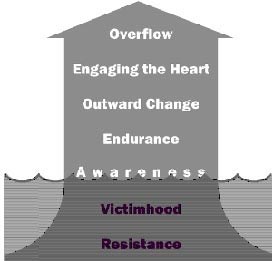At 22 and fresh out of college, I was honored to be one of the first small group leaders in our new church plant. I felt like I was really doing well as a Christian and on my way to accomplishing great things in the Kingdom of God. Two years later, the group I had invested so much of myself in decided together to disband because they felt they "weren't having a good small group experience". Ouch. That event was the beginning of a two-year series of blows to my confidence that led me to the point of giving up on my call. I thought my usefulness to God as a leader was over.
But looking back 20 years later, I see that as a defining moment in my life and the foundation of much of what I do in ministry. Failing at such a profound level bared my soul to God in a way that I would not trade for anything.
The purpose of suffering and difficulty in life is to break open the deep places of our hearts so Christ can enter in and remake the core of our beings. This kind of heart transplant is what makes the ministry you offer to others transformational. It is not your strengths or skills that qualify you for effective small group leadership, but how you meet God in your difficulties and failures.
When you have met God in times of trouble and He has reshaped your heart through them, you will not tend to look back on those events primarily as times you were victimized or had to survive, but as a gift you would not want to be without.Jesus says it like this: "When a woman gives birth, she has a hard time, there's no getting around it. But when the baby is born, there is joy in the birth. This new life in the world wipes out memory of the pain" (John 16:21 MSG). Developing leadership character is painful, but the joy of seeing how God uses it makes you overlook the pain and see those times as treasures.
Since 'Many are the afflictions of the righteous' (Ps 34:19), you as a leader are probably in the middle of challenge or difficulty right now. How can you engage God's purpose in what you face today? We will walk through how to engage God with the heart using the example of a leader who is having a difficult time raising a teenage daughter (communication has broken down, the teen is acting out, and dad and mom are getting frustrated and lashing back). See if you can apply these principles to your present situation.
Stages of Engaging God

The diagram is a visual picture of how we move toward engaging God with the heart. Most of the time we start at the bottom of the diagram, under water. Our perspective on what is happening is limited by the murk of life, so we see it as a bad thing, not a God thing. The instinctive response is to push back and resist the circumstance—the first stage of engaging. "I don't like what's happening with my daughter, so I try to make it stop by grounding her, setting stricter boundaries, or having a little talk."
If exerting our personal power does not change our circumstances, we might move up a step on the diagram and start seeing ourselves as a victim. "It is so frustrating to be fighting with her all the time! There is no peace in our house any more. God, get me out of this somehow!"
Victimhood is a "life is happening to me" posture where something I do not deserve is getting me down, and I cannot do anything about it. Victimhood is a passive strategy I can use so that I do not have to look at myself or let God deal with me. Things only seem unfair as long as we are externalizing the problem.
Rising Above
The transition from flailing around in the muddy waters of adverse circumstances to rising above them happens when we become aware that God is at work in us. Instead of seeing my situation as a bad thing, we begin to search for God's growth purpose in it:
- What does God want to do in me through this?
- If God had custom designed this situation and it is exactly what I need for my growth, what would that mean He was doing?
- How can I look at this as a growth opportunity instead of a problem?
Awareness moves us from blaming others to seeing adversity as an opportunity for God to change me. That is God's purpose for suffering: to grow us into Christ's image. Romans 8:28 says it well: "And we know that God causes all things to work together for good to those who love God, to those who are called according to His purpose." The word "good" in this verse is talking about good character. God will take everything that happens to you and use it to grow your character—if you are willing to let him work with you according to this purpose. The attitude that most aligns with God's purpose in your adversity (and therefore will most quickly get you out of it!) is to say, "God, you sent me this situation because I need it for my growth. I want everything you have for me in this. Don't hold back, lord: deal with me!"
Beyond Survival
Becoming aware of God's purpose for you in adversity helps you quickly rise past the next level on the diagram, endurance. Endurance is surviving the trouble without understanding it or learning from it. An enduring response in our parenting example might be to decide that there is only a year left until your daughter goes to college, and you can ride this out until she leaves.
What a missed opportunity! All the pain you have had to go through in this conflict is accomplishing nothing. If you find yourself in survival mode, you probably have not yet gotten a clear picture of why or how you need to grow through your situation.
Another way we can stop short of God's purpose is by making only outward changes to our behavior—the next step on the diagram. We engage God with our heads instead of opening our core being to be transformed. For example, I might practice the skill of listening more to my teenage daughter and dialing back the advice, or I could learn that my body language sets her off, or discipline myself to cool off before responding instead of getting angry. Those are important, practical lessons that may make a difference, but the change God has in store lies much deeper.
Engaging with the Heart
Transformation happens when we allow circumstances to bring our hidden, inner self to the light. David was a master at engaging at this level.In one instance he asked, "Search me, O God, and know my heart, try me and know my anxious thoughts; and see if there be any hurtful way in me…" (Ps 139:23). That is how you engage with the heart.You ask the questions that expose your motives, beliefs, values, passions, and what drives you in the situation.
- What part of this conflict with my daughter is my problem?
- What drives me to keep telling her what to do when she really longs to be heard?
- What is my deepest desire in this situation? My deepest pain?
- What do I believe about my daughter? How do I see her? How does God see her?
- What does God want to point out about me?
The conflict with your teen is not something to get through as soon as possible so you can go back to the real Kingdom work of being a small group leader. God wants to use your daughter's acting out to expose your heart. When a relationship you deeply care about is broken, it opens you up to change in ways that nothing else will. It is one of the reasons He gave you a family in the first place. Meeting God in adversity is the Kingdom work.
Overflow
That leads to great things. When you open your heart to God, His heart begins replacing yours. Christ becomes incarnate (embodied) in you, and the more Jesus resides in who you are at a deep, foundational level, the more His power will overflow through you to transform the people you lead (the top level of our diagram).
Christ's life overflowing from you to others is the ultimate objective for how we face adversity in life. Skills, training, education, gifting—all those are helpful, but great Kingdom leadership that transforms hearts is formed by meeting God in the fire of adversity.








